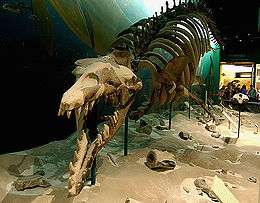Basilosaurinae
Basilosaurinae is a subfamily of cetaceans archaeocetes containing two genera: Basilosaurus and Basiloterus.[1] They were characterized by elongated distal thoracic vertebrae, lumbar, and proximal sacrococcygeal. All known members of the subfamily are larger than their relatives of the Dorudontinae subfamily except Cynthiacetus.[2]
| Basilosaurinae | |
|---|---|
 | |
| Basilosaurus skeleton | |
| Scientific classification | |
| Kingdom: | Animalia |
| Phylum: | Chordata |
| Class: | Mammalia |
| Order: | Artiodactyla |
| Infraorder: | Cetacea |
| Family: | †Basilosauridae |
| Subfamily: | †Basilosaurinae Miller, 1923 |
| Genera | |
It was declared an invalid subgroup of Basilosauridae by Uhen 2013.[1]
Classification
- Subfamily Basilosaurinae
- Genus Basilosaurus
- Basilosaurus cetoides
- Basilosaurus isis
- Genus Basiloterus
- Basiloterus hussaini
- Genus Basilosaurus
Notes
- Basilosauridae in the Paleobiology Database. Retrieved July 2013.
- Uhen 2008
gollark: It's £9250/year and even that is pretty subsidized in a weird indirected way.
gollark: That was one of them, but also you apparently get more total money from going to university, even accounting for not doing work for several years. It's hard to predict future income trends though.
gollark: I looked at the datoids™, and this seems a bad idea for various reasons.
gollark: I am probably to go to university next year, but I still haven't actually decided what to study.
gollark: ++remind 35m a
References
- Uhen, Mark D. (2008). "Basilosaurids". In Perrin, William F.; Wursig, Bernd; Thewissen, J.G.M. (eds.). Encyclopedia of Marine Mammals (2 ed.). Academic Press. pp. 91–4. ISBN 978-0-12-373553-9.CS1 maint: ref=harv (link)
- Uhen, Mark D. (2013). "A review of North American Basilosauridae". Alabama Museum of Natural History Bulletin. 31 (2): 1–45.CS1 maint: ref=harv (link)
This article is issued from Wikipedia. The text is licensed under Creative Commons - Attribution - Sharealike. Additional terms may apply for the media files.